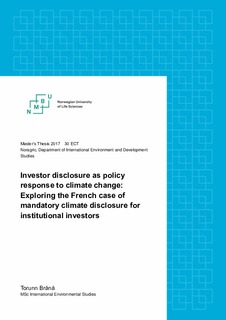| dc.description.abstract | The purpose of this thesis is to contribute to the academic and political debate on climate-related disclosures as a policy response to climate changes. Specifically, the study provides empirical evidence from a qualitative case study exploring the French climate-related transparency regime for institutional investors (FCTR) anchored in Article 173-VI of the French Energy Transition Law. This case is of particular interest because it represents the first attempt at mandating climate-related disclosures for institutional investors. While this case has received a great deal of attention in political and financial circles globally, it remains largely undiscovered in academic terms.
The purpose of the thesis is operationalised through four research questions. Firstly, the study seeks to investigate what the FCTR is, and how it can be understood as political phenomenon. Next, it asks what kind of institutional structures the transparency regime represent, and how these impact investors. Drawing on this insight, the third question sets out to identify impacts and limitations with the current configuration of the FCTR. Finally, the fourth question aims to propose a set of recommendations for the future development of climate-related disclosures for institutional investors. The study applies a stakeholder approach to the selection of informants, aiming to illuminate the case from several relevant angles. In total, 14 semi-structured interviews were conducted with representatives from six stakeholder groups: asset owners, asset managers, financial intermediaries, NGOs/interest organisations, public authority, and researchers. The study finds that the FCTR, and the institutional foundation it builds on, has strengthened the development of ‘climate conscious’ norms amongst institutional investors. The role of ‘norm entrepreneurs’ from interest organisations, and to some degree the Government and the finance industry, has been identified as an important factor in the norm building; so has the momentum created by the French presidency of COP21. However, the climate conscious norms seem to be at a pre-internalised stage as of now, and their implications for investor choices appear to be limited. Another key finding is that the FCTR has sped up the research and development efforts into metrics and indicators usable to measure climate-related risks, opportunities, and impact. The final institutional aspect of the FCTR, formal rules, appears rather weak as the FCTR is constructed on a comply or explain fundament and does not currently have any formal monitoring body or sanction structures. Nonetheless, it appears from the findings that investors feel obliged to comply with the law for reputational reasons. In sum, the FCTR is a greenfield policy project that deserves some patience while the mechanisms are tested. Still, it is worth exploring its preliminary impacts and shortcomings, as other states have signalled that they will not be far behind France in mandating investor climate disclosure. | nb_NO |

